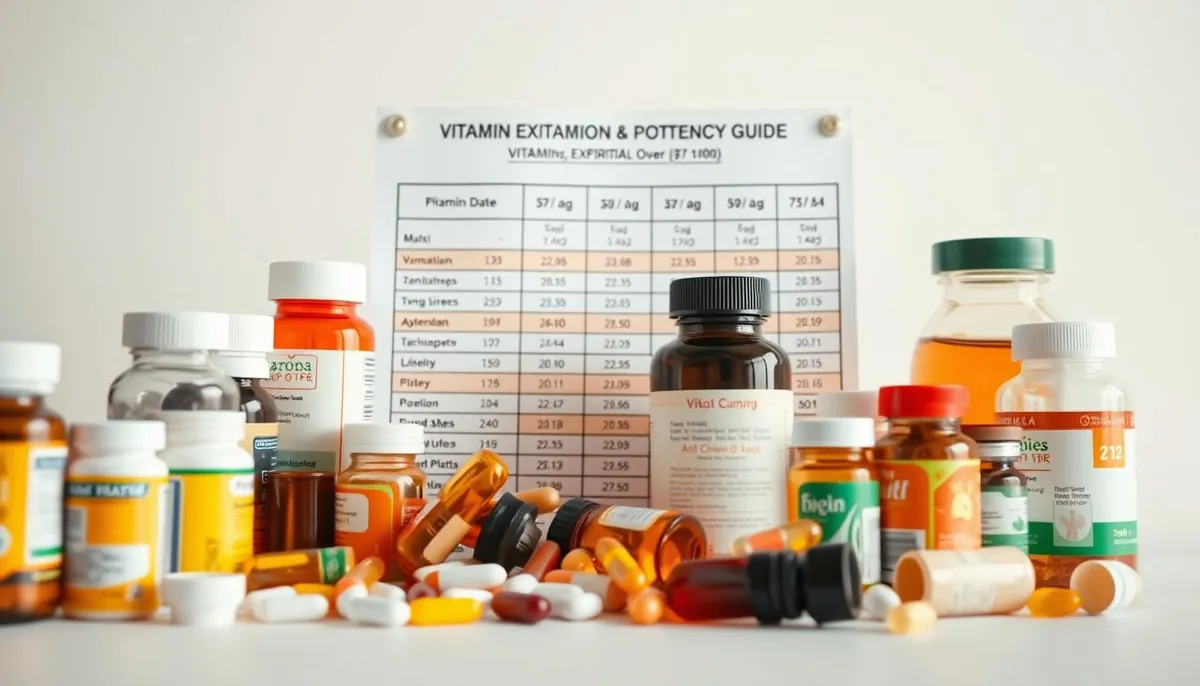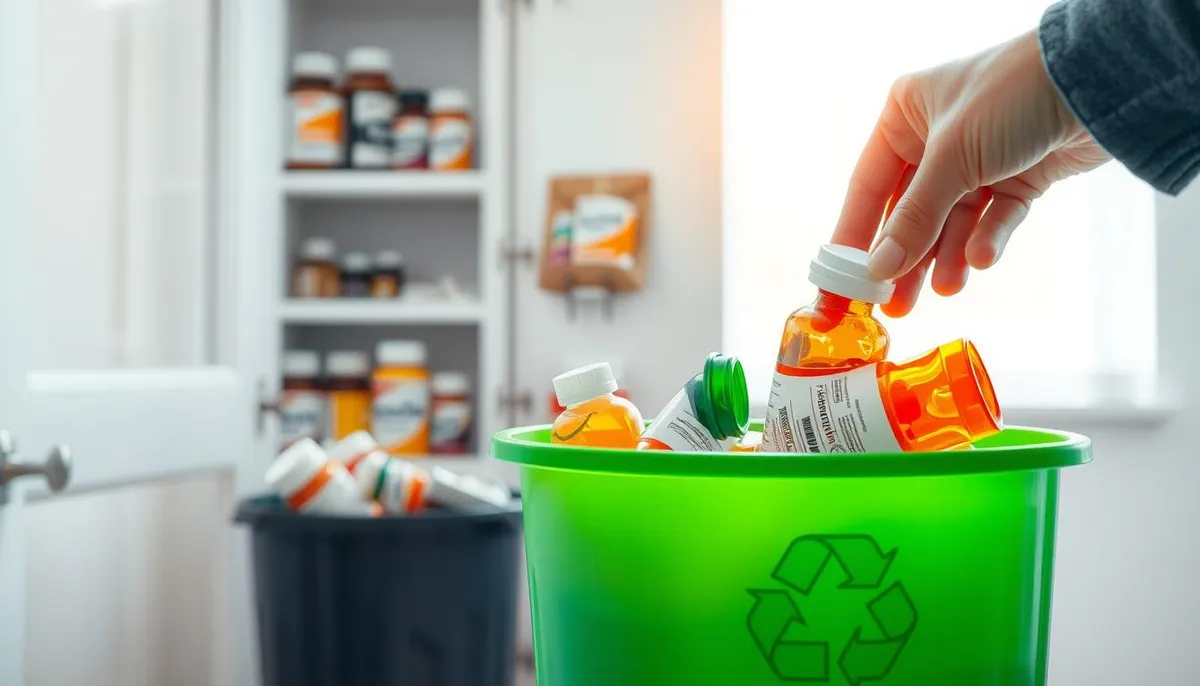Welcome to your essential guide on supplement potency and quality. Many health-conscious individuals discover a forgotten bottle in their cabinet and wonder about its effectiveness. This moment connects to a larger goal: maximizing your life potential through informed choices.

Your supplements represent a smart investment in your wellness. Understanding their shelf life ensures you get maximum value from every purchase. This knowledge is a key piece of a comprehensive strategy for longevity and optimal health.
Our guide draws on scientific research and expert insights. We provide trustworthy information on factors affecting potency and best storage practices. This empowers you to feel confident about your supplement routine.
Inspired by innovative approaches to wellness, we believe informed decisions are the foundation of defying aging. Let’s explore how to make the most of your health investments.
Key Takeaways
- Understanding supplement expiration is crucial for maximizing their health benefits.
- Potency and quality can decline over time, affecting the value of your investment.
- Proper storage practices are essential for maintaining supplement effectiveness.
- Making informed decisions about your vitamins is part of a larger longevity strategy.
- Safety and efficacy should be top priorities when evaluating older supplements.
Introduction to Vitamin Shelf Life and Expiration
The concept of supplement shelf life differs significantly from how we think about food expiration. Unlike perishable items that spoil, dietary supplements gradually lose their effectiveness over time. This gradual decline in potency is what truly defines their shelf life.
Understanding Vitamin Potency Over Time
Research shows most vitamin supplements maintain their full labeled potency for about two years under proper storage. However, different types break down at varying rates. Water-soluble options like vitamin C and B-complex tend to lose potency faster than fat-soluble varieties.
The FDA doesn’t require expiration dates on these products. Manufacturers voluntarily provide “best before” dates based on stability testing. These dates are conservative estimates designed to guarantee you receive maximum quality.
The Role of Expiration Dates in Supplement Quality
Expiration dates represent the manufacturer’s promise of full potency rather than a safety cutoff. Military research found that many medications remain effective well beyond their printed dates. This suggests vitamin supplements may also maintain usefulness past their expiration.
Understanding this timeline empowers you to make cost-effective decisions about your health routine. Proper storage plays a crucial role in maintaining supplement effectiveness throughout their shelf life.
Key Factors Influencing Vitamin Shelf Life
The longevity of your supplement investment hinges directly on several controllable factors. While expiration dates provide a baseline, real-world conditions play the biggest role in preserving potency. Your storage choices dramatically impact these supplements‘ effectiveness.

Impact of Storage Conditions and Temperature
Heat is a primary enemy of vitamin stability. High temperatures accelerate the chemical breakdown of active ingredients. Avoid storing your supplements in warm places like kitchens or bathrooms.
Moisture is another critical factor. Chewable or gummy vitamins are particularly vulnerable, as they absorb ambient humidity. This can lead to clumping and a faster loss of potency compared to tablet forms.
Light exposure, especially sunlight, can also degrade certain ingredients. Vitamins A and D are sensitive to photodegradation. This is why many high-quality products use dark-colored glass bottles for protection.
Packaging, Form, and Additives
The physical type of supplement influences its shelf life. Tablets are generally the most stable. Capsules offer good protection, while liquids and gummies have a shorter functional life.
Your supplement’s bottle is its first line of defense. A sealed, airtight container protects against air and moisture. Many include a desiccant packet to control humidity inside the bottle.
Some supplements have unique needs. Oil-based formulas, like fish oil, are prone to oxidation and often require refrigeration. Probiotics also typically need cool storage to maintain live cultures.
how long after vitamins expire are they good
Discovering a bottle of supplements past its printed date is a common situation for many health-focused individuals. The good news is that these products generally remain safe for consumption well beyond that point. Their effectiveness, or potency, gradually decreases instead of vanishing overnight.
Assessing Potency Loss After Expiration
The typical two years shelf life is a manufacturer’s guarantee of full labeled strength. It does not mean the product becomes useless the next day. The decline is slow, with many formulas retaining 80-90% of their value for months.
Different types have varying longevity. Multivitamins and B-complex options maintain potency for about two years. Fat-soluble varieties (A, D, E, K) are more stable, often lasting two to three years.
Minerals like calcium and zinc are very stable. Their chemical structure does not degrade easily. Specialized supplements like probiotics and fish oils have shorter functional lives due to delicate ingredients.
Indicators of Degraded Supplement Quality
Before consuming any product past expiration date, perform a quick inspection. Your senses are excellent tools for assessing quality. Look for clear signs of deterioration.
- Appearance: Check for fading, darkening, or any spots.
- Smell: A rancid or unusual odor is a red flag.
- Texture: Avoid softened, crumbly, or sticky tablets.
- Moisture: Discard anything with clumping or mold.
If your expired vitamins show no obvious changes and are only a few months old, they likely offer reasonable benefits. Products years beyond their date may provide minimal nutritional value.
Safety and Side Effects of Taking Expired Vitamins
The primary concern for most people discovering expired supplements is not just effectiveness, but potential harm. It’s a natural and important question to ask. The good news is overwhelmingly reassuring.
You can breathe easy. Taking expired dietary supplements is highly unlikely to cause any harm. There are no documented cases of illness or death from this practice. Unlike spoiled food, these vitamins do not become toxic or poisonous.
Evaluating Health Risks Versus Reduced Effectiveness
The real issue with expired vitamins is not safety, but a gradual loss of potency. Your body may not receive the full amount of nutrients listed on the label. For some people, this reduced effectiveness is the actual risk.
Specific groups should be more cautious. Pregnant women relying on folic acid to prevent birth defects need full-strength supplements. Individuals with diagnosed deficiencies, or those on restrictive diets like vegans needing B12, also require potent products.
For general wellness, a slightly old multivitamin may still offer some benefit. But if you depend on a supplement to fill a critical nutritional gap, potency is paramount. It’s always safe take a fresh product to ensure you get what you need.
Always inspect the product first. Discard anything with a strange odor, significant color change, or signs of moisture or mold. When in doubt, replacing over-the-counter vitamins is a simple step for optimal health.
Best Storage Practices to Maximize Supplement Potency
Smart storage is the secret to getting the most out of your health investments. Where you keep your supplements plays a huge role in preserving their strength and value. A little attention to this detail ensures every capsule delivers its intended benefit.
The golden rule for all vitamins is simple. Always keep them in their original, tightly sealed bottle in a cool, dry place. This protects them from light, heat, and humidity—their biggest enemies.
Optimal Locations for Vitamin Storage
Some spots in your home are better than others. Avoid convenient locations like kitchens and bathrooms. The heat from cooking and steam from showers create damaging temperature swings and moisture.
Ideal storage spots are consistently cool and dark. Think about a linen closet, a bedroom drawer, or a pantry shelf away from appliances. These areas offer stable conditions that help extend your supplement‘s shelf life.
Never transfer your vitamins to a different container. The original bottle is specially designed for protection. Keep the desiccant packet inside; it actively absorbs ambient humidity.
Using Refrigeration and Avoiding Moisture
For some products, a cool dry place isn’t cool enough. Refrigeration can significantly extend the life of delicate formulas. This is especially true for oil-based supplements.
Fish oil is a prime example. Cold storage helps prevent the oil from turning rancid. Probiotics and certain vitamin E products also benefit from the fridge.
Always check the label first! Some fish oil supplements should not be stored below a specific temperature. Following the manufacturer’s directions guarantees you are providing the best care for your vitamins.
Make sure the bottle lid is snapped shut tightly after every use. This simple habit minimizes exposure to air and moisture, keeping your supplements potent for longer.
Proper Disposal Methods for Expired Vitamins
Responsible disposal of expired health products demonstrates the same care you showed when choosing them initially. This final step protects your household and our planet.
Responsible Steps for Safe Disposal
Never toss old supplements directly into the trash. Curious children or pets might find them. Flushing them down the toilet contaminates water systems.
The FDA suggests mixing expired vitamins with used coffee grounds or cat litter. Seal this mixture in a bag before trash disposal. This makes the ingredients less appealing and accessible.
Community take-back programs offer the safest solution. Many pharmacies and police stations provide drop-off locations. Some people can even mail their old supplements for proper handling.

Protecting Family and the Environment
Different types of products may need special attention. Liquid formulas sometimes require hazardous waste facilities. Always check local guidelines for specific supplement disposal.
Search online for “[your city] medication disposal” to find programs. Some locations host annual take-back events. Others provide year-round counter services at participating stores.
Proper disposal completes your wellness journey safely. It shows respect for your family’s health and our shared environment. This careful approach matches your original commitment to quality vitamins.
Conclusion
Your journey toward optimal health includes mastering the art of supplement management. Understanding that vitamins don’t become dangerous past their expiration date but gradually lose potency empowers smarter decisions.
Storage conditions, supplement form, and vitamin type all influence effectiveness. While slightly old dietary supplements remain generally safe, those addressing specific needs deserve fresh, full-potency products.
Remember simple storage practices: cool, dry locations away from kitchens and bathrooms. Keep supplements in original containers with tight lids. Some vitamin supplements, like fish oils, benefit from refrigeration.
Regularly check dates and assess your supplements. This careful approach aligns with comprehensive wellness strategies for maximizing life potential.
For premium dietary supplements and cutting-edge insights, visit longevity-supplement.com. Their innovative approach to wellness supports your health journey.
Sign up now at longevity-supplement.com and start your path toward a longer, healthier life. Quality vitamin supplement choices maintain potency and deliver the nutrients your body needs to thrive.
FAQ
What does a supplement expiration date actually mean?
An expiration date is the manufacturer’s guarantee that a vitamin supplement will contain the full amount of nutrients listed on the label until that time. After this date, the product may begin to lose potency, meaning you get less of the active ingredients per dose.
Is it safe to take expired vitamins?
For most dry-form vitamins, like tablets and capsules, taking them after the expiration date is generally safe but less effective. They are unlikely to become harmful. However, products like fish oil or probiotics can spoil and should not be used past their expiration date due to potential health risks.
How quickly do vitamins lose their potency?
The rate at which a supplement loses potency depends on its type and storage. Most retain their full quality for about two years from the manufacturing date. After expiration, the decline is gradual. Proper storage in a cool, dry place away from heat and moisture is key to slowing this process.
Can I extend the shelf life of my vitamins?
Absolutely! You can maximize the life of your dietary supplements by storing them correctly. Always keep the bottle tightly closed in a cool, dark, and dry place, like a kitchen cupboard away from the stove or sink. Avoid storing them in a humid bathroom.
What are the signs that a vitamin has gone bad?
Look for changes in the product’s appearance or smell. For tablets and capsules, watch for unusual discoloration, a strange odor, or if they appear moist or clumped together. For liquids or oils like fish oil, a rancid or strong smell is a clear indicator of spoilage.
What is the best way to dispose of old vitamins?
To protect your family and the environment, do not flush them. A great option is to mix the expired vitamins with an unappealing substance like used coffee grounds or kitty litter, seal them in a bag, and place them in the trash. You can also check for local medication take-back programs.
RelatedRelated articles



